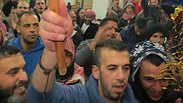
'How can we say we annexed east Jerusalem, but that Arabs who live there are not Israeli citizens?'
Photo: Hassan Shaalan
The celebrations of the terrorists' release
in Jerusalem are no different from the Palestinian release celebrations in other places. The feeling of moral injustice is equally justified here and there. The sin is the same. The only difference between east Jerusalem and the Palestinian Authority territories can be found in the words and definitions, which in a normal country should be the product of a policy.
Israel
is not building in east Jerusalem: Every new home turns into an international affair. Neither is Israel investing in east Jerusalem's Arab residents. It lets others do that. The Palestinian electric company supplies them with electricity. Legal arbitration matters are conducted in Ramallah. The education system is Palestinian, and so are the medical services, cultural institutions, and even some of the law enforcement.
Jerusalem is united in the eye of the beholder. Prime ministers like to talk about the city's unification, and most Israelis celebrate its unification and believe in it as a national necessity. Declarations are available in abundance, actions – not as much.
Prisoner Release
Eitan Haber
Op-ed: Murderers released this week will likely be the only ones to enjoy Israel's concession
I walk around there often, trying to get to know the city's remote and shabby areas too. The lack of governance is noticeable. In the Arab neighborhoods beyond the security fence, reality is even more absurd. The only contact the State of Israel has with the residents is through the army, and that too is seldom done. Israelis are not allowed to enter those neighborhoods. The mayor is not allowed to enter neighborhoods within his city. Only the words and declarations unite between the two sides of the wall.
Israel annexed east Jerusalem in 1967 and approved Basic Law: Jerusalem, Capital of Israel in 1980. In practice, in times of distress it turns out that not only the world questions the city's unification, but also the Israeli government. We ourselves. In the past few days we have heard representatives from the coalition and Eli Yishai from the opposition explaining why the residents of east Jerusalem are not real citizens.
Yishai was wrong about the color of their identity cards (he explained during a live broadcast that they were orange). Worse, he was wrong in his understanding of the Israeli policy. Others from the coalition played dumb or kept quiet as usual, with a lot of courage.
The release of terrorists from east Jerusalem under the claim that they are not "Israeli" holds a glaring mirror to our face. It forces us to come up with answers on what we have and what we don't have. How can we declare that Jerusalem is undividable and agree to its actual division? How can we say that we annexed the eastern part of the city, but that Arabs who live there are not Israeli citizens? A democratic state which declares that it belongs to the state cannot change its mind at a moment of political pressure, due to the release of terrorists, and declare that it doesn't exactly belong to the state, that they are not exactly citizens, not exactly the state's residents. The annexation of east Jerusalem was a correct and required move; the problem is the thoughtlessness which followed.
Historic Jerusalem is undividable. The City of David cannot be separated from the Western Wall, the Mount of Olives cannot be separated from the Lutheran Church's assets. The neighborhoods behind the security fence, on the other hand, are a governance fiction. The annexation in the Knesset did not create actual annexation. Regardless of the negotiations with the Palestinians, regardless of the Palestinian Authority. The Jerusalem Municipality is not there. The State is not there. No one wants to deal with this hot potato.
The release of Palestinian terrorists raises doubts about the Israeli policy. The release of Israeli murderers from east Jerusalem and the explanations that followed raise doubts on whether we even have a policy.
















